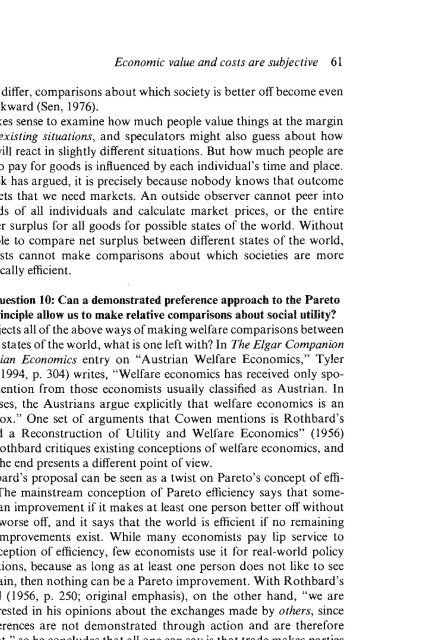Handbook on Contemporary Austrian Economics
Handbook on Contemporary Austrian Economics
Handbook on Contemporary Austrian Economics
Create successful ePaper yourself
Turn your PDF publications into a flip-book with our unique Google optimized e-Paper software.
Ec<strong>on</strong>omic value and costs are subjective 61<br />
societies differ, comparis<strong>on</strong>s about which society is better off become even<br />
more awkward (Sen, 1976).<br />
It makes sense to examine how much people value things at the margin<br />
in their existing situati<strong>on</strong>s, and speculators might also guess about how<br />
people will react in slightly different situati<strong>on</strong>s. But how much people are<br />
willing to pay for goods is influenced by each individual's time and place.<br />
As Hayek has argued, it is precisely because nobody knows that outcome<br />
of markets that we need markets. An outside observer cannot peer into<br />
the minds of all individuals and calculate market prices, or the entire<br />
c<strong>on</strong>sumer surplus for all goods for possible states of the world. Without<br />
being able to compare net surplus between different states of the world,<br />
ec<strong>on</strong>omists cannot make comparis<strong>on</strong>s about which societies are more<br />
ec<strong>on</strong>omically efficient.<br />
4.11 Questi<strong>on</strong> 10: Can a dem<strong>on</strong>strated preference approach to the Pareto<br />
principle allow us to make relative comparis<strong>on</strong>s about social utility<br />
If <strong>on</strong>e rejects all of the above ways of making welfare comparis<strong>on</strong>s between<br />
different states of the world, what is <strong>on</strong>e left with In The Elgar Compani<strong>on</strong><br />
to <strong>Austrian</strong> Ec<strong>on</strong>omics entry <strong>on</strong> "<strong>Austrian</strong> Welfare Ec<strong>on</strong>omics," Tyler<br />
Cowen (1994, p. 304) writes, "Welfare ec<strong>on</strong>omics has received <strong>on</strong>ly sporadic<br />
attenti<strong>on</strong> from those ec<strong>on</strong>omists usually classified as <strong>Austrian</strong>. In<br />
some cases, the <strong>Austrian</strong>s argue explicitly that welfare ec<strong>on</strong>omics is an<br />
empty box." One set of arguments that Cowen menti<strong>on</strong>s is Rothbard's<br />
"Toward a Rec<strong>on</strong>structi<strong>on</strong> of Utility and Welfare Ec<strong>on</strong>omics" (1956)<br />
where Rothbard critiques existing c<strong>on</strong>cepti<strong>on</strong>s of welfare ec<strong>on</strong>omics, and<br />
then at the end presents a different point of view.<br />
Rothbard's proposal can be seen as a twist <strong>on</strong> Pareto's c<strong>on</strong>cept of efficiency.<br />
The mainstream c<strong>on</strong>cepti<strong>on</strong> of Pareto efficiency says that something<br />
is an improvement if it makes at least <strong>on</strong>e pers<strong>on</strong> better off without<br />
any<strong>on</strong>e worse off, and it says that the world is efficient if no remaining<br />
Pareto improvements exist. While many ec<strong>on</strong>omists pay lip service to<br />
this c<strong>on</strong>cepti<strong>on</strong> of efficiency, few ec<strong>on</strong>omists use it for real-world policy<br />
prescripti<strong>on</strong>s, because as l<strong>on</strong>g as at least <strong>on</strong>e pers<strong>on</strong> does not like to see<br />
others gain, then nothing can be a Pareto improvement. With Rothbard's<br />
proposal (1956, p. 250; original emphasis), <strong>on</strong> the other hand, "we are<br />
not interested in his opini<strong>on</strong>s about the exchanges made by others, since<br />
his preferences are not dem<strong>on</strong>strated through acti<strong>on</strong> and are therefore<br />
. ~- irrelevant," so he c<strong>on</strong>cludes that all <strong>on</strong>e can say is that trade makes parties<br />
better off while making no <strong>on</strong>e worse off. Government interventi<strong>on</strong>, in<br />
c<strong>on</strong>trast, may benefit the intervener, but we know that it necessarily makes<br />
at least <strong>on</strong>e pers<strong>on</strong> worse off. Following the premises of the Paretian<br />
ec<strong>on</strong>omists, Rothbard goes <strong>on</strong> to state:

















